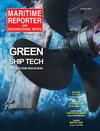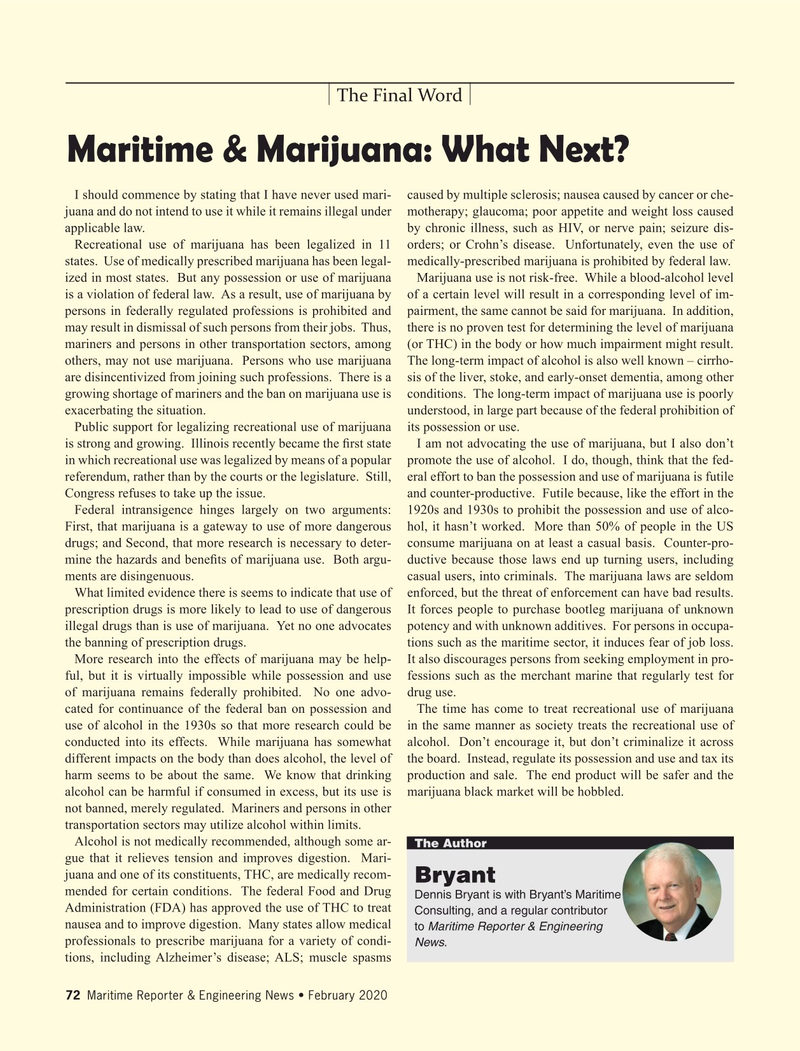
Page 72: of Maritime Reporter Magazine (February 2020)
Green Ship Technology
Read this page in Pdf, Flash or Html5 edition of February 2020 Maritime Reporter Magazine
The Final Word
Maritime & Marijuana: What Next?
I should commence by stating that I have never used mari- caused by multiple sclerosis; nausea caused by cancer or che- juana and do not intend to use it while it remains illegal under motherapy; glaucoma; poor appetite and weight loss caused applicable law. by chronic illness, such as HIV, or nerve pain; seizure dis-
Recreational use of marijuana has been legalized in 11 orders; or Crohn’s disease. Unfortunately, even the use of states. Use of medically prescribed marijuana has been legal- medically-prescribed marijuana is prohibited by federal law.
ized in most states. But any possession or use of marijuana Marijuana use is not risk-free. While a blood-alcohol level is a violation of federal law. As a result, use of marijuana by of a certain level will result in a corresponding level of im- persons in federally regulated professions is prohibited and pairment, the same cannot be said for marijuana. In addition, may result in dismissal of such persons from their jobs. Thus, there is no proven test for determining the level of marijuana mariners and persons in other transportation sectors, among (or THC) in the body or how much impairment might result. others, may not use marijuana. Persons who use marijuana The long-term impact of alcohol is also well known – cirrho- are disincentivized from joining such professions. There is a sis of the liver, stoke, and early-onset dementia, among other growing shortage of mariners and the ban on marijuana use is conditions. The long-term impact of marijuana use is poorly exacerbating the situation. understood, in large part because of the federal prohibition of
Public support for legalizing recreational use of marijuana its possession or use.
is strong and growing. Illinois recently became the ? rst state I am not advocating the use of marijuana, but I also don’t in which recreational use was legalized by means of a popular promote the use of alcohol. I do, though, think that the fed- referendum, rather than by the courts or the legislature. Still, eral effort to ban the possession and use of marijuana is futile
Congress refuses to take up the issue. and counter-productive. Futile because, like the effort in the
Federal intransigence hinges largely on two arguments: 1920s and 1930s to prohibit the possession and use of alco-
First, that marijuana is a gateway to use of more dangerous hol, it hasn’t worked. More than 50% of people in the US drugs; and Second, that more research is necessary to deter- consume marijuana on at least a casual basis. Counter-pro- mine the hazards and bene? ts of marijuana use. Both argu- ductive because those laws end up turning users, including ments are disingenuous. casual users, into criminals. The marijuana laws are seldom
What limited evidence there is seems to indicate that use of enforced, but the threat of enforcement can have bad results. prescription drugs is more likely to lead to use of dangerous It forces people to purchase bootleg marijuana of unknown illegal drugs than is use of marijuana. Yet no one advocates potency and with unknown additives. For persons in occupa- the banning of prescription drugs. tions such as the maritime sector, it induces fear of job loss.
More research into the effects of marijuana may be help- It also discourages persons from seeking employment in pro- ful, but it is virtually impossible while possession and use fessions such as the merchant marine that regularly test for of marijuana remains federally prohibited. No one advo- drug use.
cated for continuance of the federal ban on possession and The time has come to treat recreational use of marijuana use of alcohol in the 1930s so that more research could be in the same manner as society treats the recreational use of conducted into its effects. While marijuana has somewhat alcohol. Don’t encourage it, but don’t criminalize it across different impacts on the body than does alcohol, the level of the board. Instead, regulate its possession and use and tax its harm seems to be about the same. We know that drinking production and sale. The end product will be safer and the alcohol can be harmful if consumed in excess, but its use is marijuana black market will be hobbled. not banned, merely regulated. Mariners and persons in other transportation sectors may utilize alcohol within limits.
Alcohol is not medically recommended, although some ar-
The Author gue that it relieves tension and improves digestion. Mari- juana and one of its constituents, THC, are medically recom-
Bryant mended for certain conditions. The federal Food and Drug
Dennis Bryant is with Bryant’s Maritime
Administration (FDA) has approved the use of THC to treat
Consulting, and a regular contributor nausea and to improve digestion. Many states allow medical to Maritime Reporter & Engineering professionals to prescribe marijuana for a variety of condi-
News. tions, including Alzheimer’s disease; ALS; muscle spasms 72 Maritime Reporter & Engineering News • February 2020
MR #2 (66-74).indd 72 2/6/2020 11:31:11 AM

 71
71

 73
73
